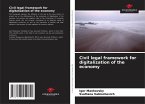The digital revolution has taken place. This wave of digitalization has changed the economy and many business models. It has given rise to the emergence of a digital economy that calls into question the creation of value and presents characteristics and logic radically different from those of the traditional economy. In addition, issues and challenges may arise in relation to the taxation of the digital economy. What all digital economy players have in common is the intensity of the exploitation of data resulting from the regular and systematic monitoring of their users' activities. The absence of monetary consideration for the activity of Internet user-customers partly expresses the extraordinary productivity gains in this economy. A common feature of global companies in the digital economy is the low level of taxation of their profits. Tax law, both national and international, is struggling to adapt to the effects of the digital revolution. It is indeed difficult to determinewhich tax administration is legitimate to levy taxes.
Bitte wählen Sie Ihr Anliegen aus.
Rechnungen
Retourenschein anfordern
Bestellstatus
Storno









